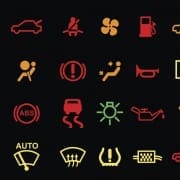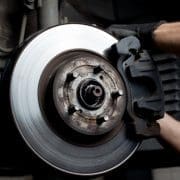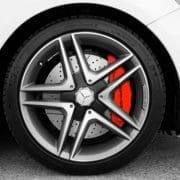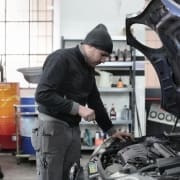5 Warning Lights You Should Never Ignore!
If any of the above warning lights come on while you are driving, DO NOT IGNORE THEM! Immediate action may be necessary to prevent damage to your car, a breakdown or an accident. See below for more detail on the warning light that is showing on your dash:
OIL PRESSURE WARNING LIGHT



Possible Causes: Low oil level (due to oil consumption or leaks), oil viscosity too thin, worn oil pump, excessive engine bearing clearances or defective oil pressure sending unit.
If you engine is also making ticking, clattering or rapping noises, it is not getting sufficient oil. If you attempt to drive the engine in this condition, you will probably damage it – if it hasn’t already suffered major internal damage.
TEMPERATURE WARNING LIGHT



CAUTION: DO NOT open the coolant reservoir or radiator cap until the engine has cooled off for at least 30 minutes. Steam pressure inside the cooling system can blow out and burn you!
If the coolant level is low, add coolant (a 50/50 mixture of antifreeze and distilled water).
Possible Causes: Low coolant level (due to coolant leak or bad head gasket), stuck thermostat, bad water pump, broken serpentine belt, defective radiator cooling fan, clogged or dirty radiator, exhaust restriction (plugged catalytic converter).
CHARGING SYSTEM WARNING LIGHT



Possible Causes: Broken or slipping serpentine belt or V-belt, bad alternator, charging control fault, or loose or corroded battery cables.
Open the hood to see if the alternator drive belt is intact and is turning the alternator while idling. If the belt is not the problem, chances are the charging system has a problem that will have to be diagnosed and repaired. It’s always best to have a qualified mechanic take a look.
BRAKE WARNING LIGHT


Carefully apply the brakes to see if they are working. If they are, pull over to the side of the road, open the hood and check the fluid level in the brake master cylinder. Should the fluid level be low, the brake system should be inspected for leaks. If there are leaks, your brake system is unsafe to drive.
If the brake pedal is low or goes to the floor, pumping the pedal may apply enough pressure to stop your car. Failing that, apply your parking brake to slow your vehicle. Also, take your foot off the accelerator and shift to neutral, or downshift and use engine braking to slow your vehicle if you have a manual transmission. If all that fails, aim for something soft like a bush or open field.
Possible Causes: Loss of brake fluid due to leaks (master cylinder, calipers, wheel cylinders, brake lines or hoses), failure of the pressure differential switch that activates the brake light, parking brake pedal or handle not fully releasing, defective parking brake switch.
WARNING: If the brake pedal feels soft, is low, goes to the floor, or you have to pump the pedal to get your vehicle to stop, your vehicle is unsafe to drive. You should have it towed to a repair facility for repairs.
TPMS LIGHT
![]()
![]()
Find a petrol station, and check the pressure in each tyre with an accurate gauge. Inflate your tyres to the recommended pressure (see your owners manual or the tyre inflation decal on the driver door panel or glove box). For most passenger cars, the recommended pressure is typically 2.2 to 2.5 bar.
Possible Causes: Loss of air pressure due to a leak (such as a nail or small puncture in a tyre, or a bad valve stem), loss of air pressure due to seepage (0.1 to 0.2 bar per month loss is normal for many tyres), or inaccurate or failing TPMS sensor in tyre.
Check your tyres regularly – at least once a month or before any long road trip. Do this when they are COLD and BEFORE you’ve driven far.
If you are having trouble diagnosing your warning light, book and inspection with Michanic and we will send out a trusted mechanic to solve your problem. We understand that your car plays an important part of your daily life, transporting you and your loved ones. Michanic is dedicated to providing the most convenient services for our customers, so if you have any other questions or concerns regarding your car, feel free to talk to our customer service team through email at [email protected], or by phone on 087 803 9000.







